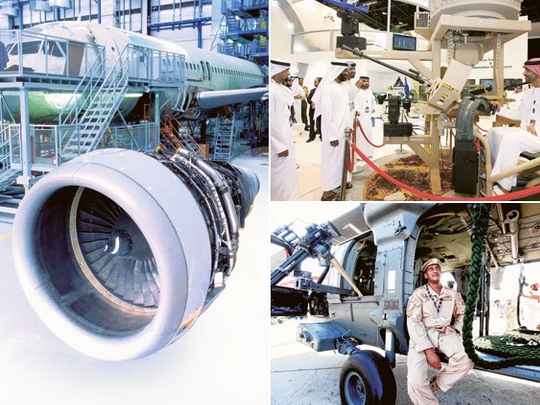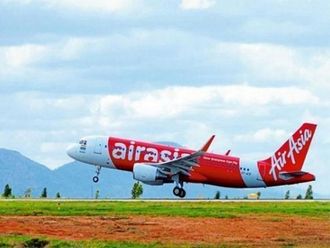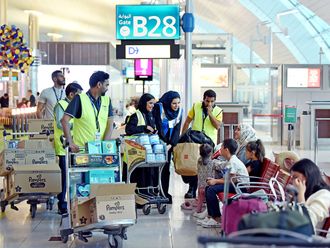
A few years ago no one would have thought the UAE could manufacture aircraft spare parts or components, let alone assemble its own aircraft. However, that perception is changing fast. The country has largely remained a buyer of aircraft for years as its five airlines — Emirates, Etihad Airways, Air Arabia, RAK Airways and flydubai — have been placing aircraft orders to expand their fleets.
The UAE is now looking at assembling its own aircraft by 2018 while a major aviation cluster is currently taking shape.
The UAE has a few advantages in these initiatives — a large pool of liquidity for investment, strong air travel demand across the region and an abundance of hydrocarbons that could be developed into petrochemical products — that help in components and parts. The challenges remain in getting the right talent and securing the technology to manufacture aircraft.
Driven by government initiatives, a number of companies have been set up to transfer technology and knowhow to help develop industries that will support the global aviation and aerospace industry.
Much of the talent will be home-grown by companies such as Mubadala, Tawazun and others who are inducting local graduates into training.
Mubadala, Abu Dhabi's $45 billion (Dh165.24 billion) sovereign wealth fund, set up an aerospace division in 2006. The plan is for it to break even by 2013. It is spending around $1 billion to build another facility in Al Ain.
Recently Mubadala Development Company, owned by the Abu Dhabi Government, signed a series of agreements with global partners, including the Boeing Company, that will help it to bring in the latest technology and produce aircraft components in the new aviation cluster in Al Ain.
The UAE-based manufacturers gained several investors' attention at the Dubai Air Show with its multi-purpose aerospace clusters that provide design, engineering support, development, testing and manufacturing of aircraft for civilian and defence purposes.
"These important agreements will strengthen the businesses of both Mubadala and Boeing. Building on the strategic framework we and Mubadala announced at the last Dubai Airshow, we are now demonstrating our solid commitment to our partner, the UAE and the Middle East region," said Jim McNerney, Chairman, President and CEO of the Boeing Company.
Endorsement
McNerney's comments are a solid endorsement of Mubadala's capabilities. Mubadala Aerospace has not wasted time identifying aerospace sectors in which it can be a competitive player. It is focusing on composite aero-structures manufacturing, maintenance, repair and overhaul (MRO) in both civil and military markets and aviation training. In just a year, Strata — a Mubadala Aerospace subsidiary — which opened a manufacturing facility in Al Ain in May 2010, has been producing complete shipsets of flap track fairings for the Airbus A330 airliner. The company wants to increase its role in Airbus programmes and is already set to be the sole flap track supplier for the A380, as well as to partner with other airframe makers, including Boeing.
"We want to take Strata up to another level of manufacturing that will include more engineering work," Humaid Al Shemmari, Mubadala Aerospace Executive Director, told Gulf News. "This will mean adding extra capacity and automating processes. So instead of having 30 people doing a specific task, we will have two machines and ten people doing it."
A more immediate target for the group is to be ready to play a part in the development of the next generation of narrow-body airliners. Mubadala hopes that by the middle of 2012 it will have completed an acquisition that would put it in a prime spot to move into one or both of the respective Airbus and Boeing programmes.
"Then all the building blocks will be in place for us to become a Tier One risk-sharing partner around 2014 to 2016," said Al Shemmari. "We want to be ready to take the lead in research and development and to be subcontracting work to others."
Mubadala is also close to announcing a tie-up between universities in the US and the UAE to jointly develop a new degree in aerospace engineering for UAE students. For the time being, the company is mainly recruiting graduates in mechanical and electrical engineering.
Acquisition
In the MRO sector, Mubadala has been looking to build its capabilities by buying expertise. The acquisition of Swiss-based MRO group SR Technics brought a wealth of what Al Shemmari referred to as "human capital". This skills base is being used to develop the capabilities of its Abu Dhabi Aircraft Technologies (ADAT) subsidiary, which is active in civil aircraft support, with Abu Dhabi's Etihad Airways being one of its newest clients.
Meanwhile, Abu Dhabi-based Tawazun Holding is a strategic investment firm established in 2007 and it is focused on the long-term development of Abu Dhabi's industrial manufacturing and technology capacity and knowledge transfer with a specific focus on the defence sector.
Saif Al Marzouqi, Associate Director of Corporate Communication at Tawazun, told Gulf News: "Tawazun's objective are guided by Abu Dhabi's economic vision 2030 which focuses on economic diversification and sustainability, technology transfer and value addition to the people of the UAE through training and creation of new opportunities."
Eleven major companies are under the umbrella of Tawazun. Caracal is a small-arms manufacturer, established by Tawazun in 2002 to develop a range of modern pistols in association with leading European weapon designers and international users.
Caracal Light Ammunition and Burkan are the first of its kind factories in the UAE and the Gulf Cooperation Council, which manufacture and test various types of ammunition, including aircraft bombs, rockets, tank artillery, mortars, and infantry and naval ammunition.
Marwan Lahoud, Chief Strategy and Marketing Officer, EADS/Airbus, says: "Through a collaborative effort and a cohesive plan, Abu Dhabi is demonstrating to the world at large that it has the potential to become a major hub for aerospace, aviation and space innovation and development.
"Once these industries start delivering as envisioned by the government, then they will not only help diversify the UAE economy, they will work as a major catalyst for import substitution and help boost the country's export earnings."












